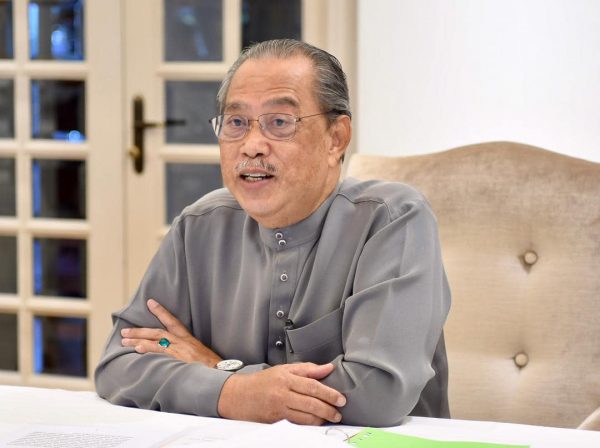Malaysias Muhyiddin Finally Steps Down As Prime Minister
 Advertisement
AdvertisementMalaysia’s Prime Minister Muhyiddin Yassin stepped down on Monday after trying â€" and failing â€" to seek opposition backing to remain in power. While this brings an end to his beleaguered premiership, it adds even more chaos to the country’s politics as party leaders scramble to form the next government.
Muhyiddin will not leave office immediately. He will stay on as caretaker prime minister until his successor is selected. That person will then serve as premier until the next general election takes place within two years.
“I can take the easy route and sacrifice my principles to remain as prime minister. But that is not my choice. I will not compromise with kleptocrats or interfere with the freedom of the judiciary, just to stay in power,†Muhyiddin said in a televised address to the nation about an hour after he submitted his resignation. “I’ve tried to come up with ideas to save this administration. But they didn’t work, as some quarters would rather grab power than prioritize the lives of the people.â€
King Sultan Abdullah Sultan Ahmad Shah, who appointed Muhyiddin as prime minister after a week-long political crisis 17 months ago, is expected to use his constitutional power once again to select Muhyiddin’s replacement. This should be from among members of parliament who he thinks can command a majority, which Muhyiddin claims no one else has.
The 74-year-old admitted for the first time on Friday that he did not have majority support and made a last-ditch attempt to win over opposition lawmakers by promising political and electoral reforms in exchange for support. But that gambit failed and the offer was rejected unanimously.
Opposition coalition Pakatan Harapan (PH) and Muhyiddin’s key ally, the United Malays National Organisation (UMNO), denounced the prime minister’s offers as “open bribery†which left Muhyiddin with no other choice other than to step down.
A slew of candidates is already jockeying to take over and become the next prime minister, with Deputy Premier Ismail Sabri Yaakob emerging as a frontrunner for the top post. The changes to the leadership hierarchy of the Perikatan Nasional (PN) government will likely see several cabinet members, in particular Vaccine Minister Khairy Jamaluddin, retain their positions.
Diplomat BriefWeekly NewsletterNGet briefed on the story of the week, and developing stories to watch across the Asia-Pacific.
Get the NewsletterDespite an initially slow rollout, Malaysia’s daily COVID-19 vaccination rate per capita is now one of the fastest globally. This is arguably PN’s only success story during its short-lived time in power.
AdvertisementOpposition leader Anwar Ibrahim and UMNO veteran Tengku Razaleigh Hamzah are also expected to compete for the leadership.
Others are calling for a different type of leadership in the form of the country’s first female prime minister. Two-time premier Mahathir Mohamad mooted the setting up of a bipartisan National Operations Council that would govern the country until a new government can be formed.
In any case, whoever takes Muhyiddin’s place will inherit the still-unresolved political crisis and face the same complex political reality that he did. They will also face a worsening public health emergency.
The countdown to Muhyiddin’s departure began the moment he was appointed prime minister. His PN government was neither democratically mandated by the electorate, nor was it endorsed in parliament, which political experts say has hurt his political legitimacy.
The PN coalition has been called a “back-door government,†with opponents accusing Muhyiddin of betrayal for pulling Parti Pribumi Bersatu Malaysia out of the PH bloc to join hands with UMNO, the Pan-Malaysian Islamic Party, and a rebel faction from Anwar Ibrahim’s Parti Keadilan Rakyat. This resulted in PH losing its majority in parliament.
When Muhyiddin took over, he stressed that he accepted the top job solely as a means to end the country’s political storm. “I am not a traitor. I am here to save our country from any form of crisis.†Over a year later, the political crisis is back where it started as the pandemic rages on.
When Muhyiddin was appointed as prime minister on March 1, 2020, the total number of COVID-19 cases in Malaysia was 29 with zero deaths. Today, on the day of his resignation, the total number of cases is 1.4 million with 12,510 deaths.
If anything, Muhyiddin’s fleeting premiership will be remembered for its lack of political validity, its mishandling of the COVID-19 pandemic, and for putting the country’s democracy to the test in an unprecedented way.
Muhyiddin tried to weather the political turmoil by attempting to appease UMNO â€" the largest party in the ruling alliance â€" with key cabinet appointments and positions in state-owned companies, although this proved to be inadequate as the “grand old party†was unwilling to play second fiddle to Muhyiddin’s party.
As divisions proliferated within Muhyiddin’s PN coalition, so did the country’s COVID-19 case numbers and death count. On social media, the hashtags #kerajaangagal (failed government), #benderaputih (white flag), and #benderahitam (black flag) trended for much of the year in reference to the government’s disconnected COVID-19 response.
AdvertisementIts “total lockdown†failure and emergency rule debacle have exhausted the population and wrecked businesses. Frustration is escalating, leaving many agitating for him to leave office, including probably the monarch. And it ultimately doomed his premiership.
However, Muhyiddin survived as long as he did in part because opposition lawmakers or breakaway allies couldn’t agree on anyone better. All eyes are now on the king. What is certain, however, is that this political saga isn’t over.
0 Response to "Malaysias Muhyiddin Finally Steps Down As Prime Minister"
Post a Comment